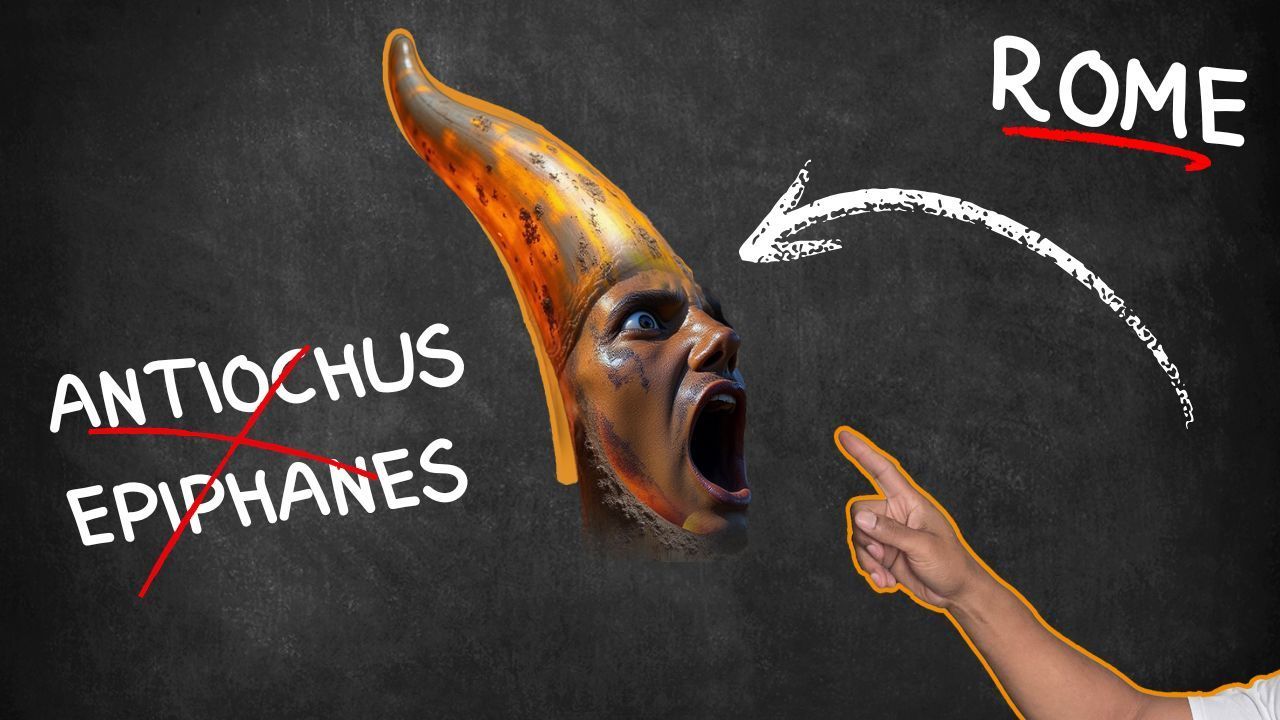
As an Evangelical or Catholic Christian, it is likely that you identify the Little Horn in Daniel 8 as the Greek king who persecuted the Jews in the 2nd century BC known as Antiochus Epiphanes. As you may know, Seventh-Day Adventists maintain that this prophetic symbol refers to the Roman Empire.
In this article, I will utilize the information presented in the previous studies to summarize all the reasons why you should also believe that the Little Horn represents the Roman Empire rather than Antiochus Epiphanes. However, I will begin this article explaining why you and millions of other Christians believe the Little Horn is Antiochus Epiphanes.
Why the Antiochus Interpretation Seems Logical
The Bible and the book of Maccabees describe a king that appears to come out of one of the Greek Empires
| Daniel 8:9 | 1Maccabees 1:11 |
|---|---|
| And OUT OF ONE OF THEM came forth a little horn, which waxed exceeding great... | And THERE CAME OUT OF THEM a wicked root, Antiochus the Illustrious... |
The Bible and the book of Maccabees describe a king who waxed great towards the South
| Daniel 8:9 | 1Maccabees 1:20 |
|---|---|
| And out of one of them came forth a little horn, which waxed exceeding great, towards the SOUTH... | And he took the strong cities in the land of Egypt: and he took the spoils of the land of EGYPT. |
The Bible and the book of Maccabees describe a king who waxed great towards the East
| Daniel 8:9 | 1Maccabees 6:1,3 |
|---|---|
| And out of one of them came forth a little horn, which waxed exceeding great..towards the EAST... | ...Lo, he came and sought to take the city [ELYMAIS in Persia] and to pillage it. |
The Bible and the book of Maccabees describe a king who waxed great towards the Pleasant Land
| Daniel 8:9 | 1Maccabees 1:22 |
|---|---|
| And out of one of them came forth a little horn, which waxed exceeding great..towards the PLEASANT LAND... | And he went up to JERUSALEM with a great multitude...and he fell upon the city suddenly, and struck it with a great slaughter, and destroyed much people in Israel |
The Bible and the book of Maccabees describe a king who waxed great towards the Pleasant Land
| Daniel 8:13 | 1Maccabees 1:57 |
|---|---|
| How long shall be the vision concerning the daily sacrifice, and the TRANSGRESSION OF DESOLATION, to give both the sanctuary and the host to be trodden under foot? | ...king Antiochus set up the ABOMINABLE IDOL OF DESOLATION upon the altar of God... |
Although the author of the book of Maccabees is unknown, it appears that he lived through the Antiochus persecution. And even though Antiochus doesn't fit the whole narrative of the Little Horn in Daniel 8, it's clear to me that the writer tried to match Antiochus with the actions of the Little Horn in order to show that prophecy had been fulfilled. This commonly happens when believers experience a traumatic event; however, as a result of this forced interpretation, many God-fearing Christians are misinterpreting Daniel 8.
Ignoring the details
If I were to give you a description of a vehicle that had wheels, doors, and an engine, and ask you what type of vehicle I am describing, you will likely tell me that I am describing a car. This is logical. However, what if I then told you that this vehicle had turbines and two wings? Then, after taking the full description into account, you would most likely realize that it can't be a car; it must be an airplane.
What I have discovered is that many good Christians believe that the Little Horn is Antiochus because they are ignoring the "turbines" and the "wings" when reading Daniel 8. They are only focused on the "wheels" and the "doors," and thus are convinced that it's a car, when in fact it's an airplane.
In order to help you see the truth of this misinterpretation of Scripture, I have listed seven problems with the Antiochus theory. By the end of this article, I hope that you will be able to see that when we take into account all the details surrounding the Little Horn, it cannot be Antiochus Epiphanes.
Seven Critical Problems with the Antiochus Interpretation
1. The Little Horn did not arise out of another horn
Daniel 8:8-9 states that the Little Horn came "out of one of them." The question is: what does "them" refer to?
While many assume "them" refers to the four horns (kingdoms), the sentence structure allows for another interpretation. Remember, verse 8 says, "Therefore the he goat waxed very great: and when he was strong, the great horn was broken; and for it came up four notable ones toward the four winds of heaven." Thus, "them" can refer to the four notable ones or the four winds of heaven.
In the Bible, I have yet to read about a horn arising out of another horn. This would mean that Antiochus is symbolized as rising from the Syrian Horn and operating independently of the horn that he originated from. In my mind, this is simply void of logic. When a king or kingdom is symbolized in prophecy, typically that symbol remains intact. For example, the Goat, representing Alexander the Great, doesn't separate to show Alexander's conquests. He and his kingdom are one and the same. However, in the Antiochus theory, he inexplicably splits into two horns to express this narrative.
Horns can arise from the Winds of Heaven
When we consider the winds, we can see that people go into and arise out of the winds.
- And upon Elam will I bring the four winds from the four quarters of heaven, and will scatter them toward all those winds... Jeremiah 49:36
- And he shall send his angels with a great sound of a trumpet, and they shall gather together his elect from the four winds, from one end of heaven to the other. Matthew 24:31
Even in Daniel 8, we see the directions that the four horns conquered towards were based upon the winds:
- Therefore the he goat waxed very great: and when he was strong, the great horn was broken; and for it came up four notable ones toward the four winds of heaven. Daniel 8:8
Comparing both scenarios, I hope you can see that it's Biblically logical that the Little Horn arose from one of the four winds of heaven versus one of the four horns of the Goat.
The Hebrew gender determines that the Little Horn had to arise from one of the Winds of Heaven
In Hebrew, nouns carry either a masculine or feminine gender. Thus, if we can determine that the gender of "one of them" in verse 9 matches the gender of "four notable ones" or "four winds of heaven." in verse 8, we may be able to determine where or what the Little Horn came out of.
Using the Brown-Driver-Briggs Lexicon, let's first determine the gender of "them" in verse 9: *
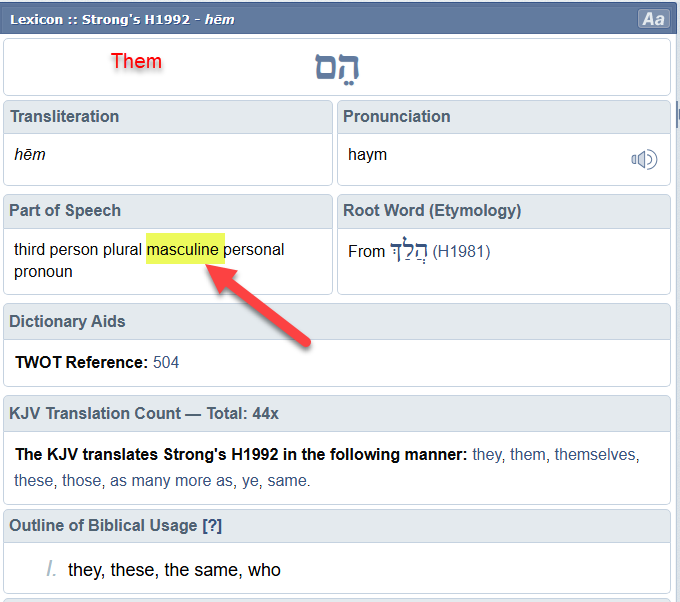
Please notice that the word "them" is masculine as highlighted in the above screenshot. Now, in order to determine what "them" is referring to, we need to analyze each noun in verse 8 through the lens of the Lexicon in order to determine if any of its nouns are also masculine.
Let's analyze "notable ones." *
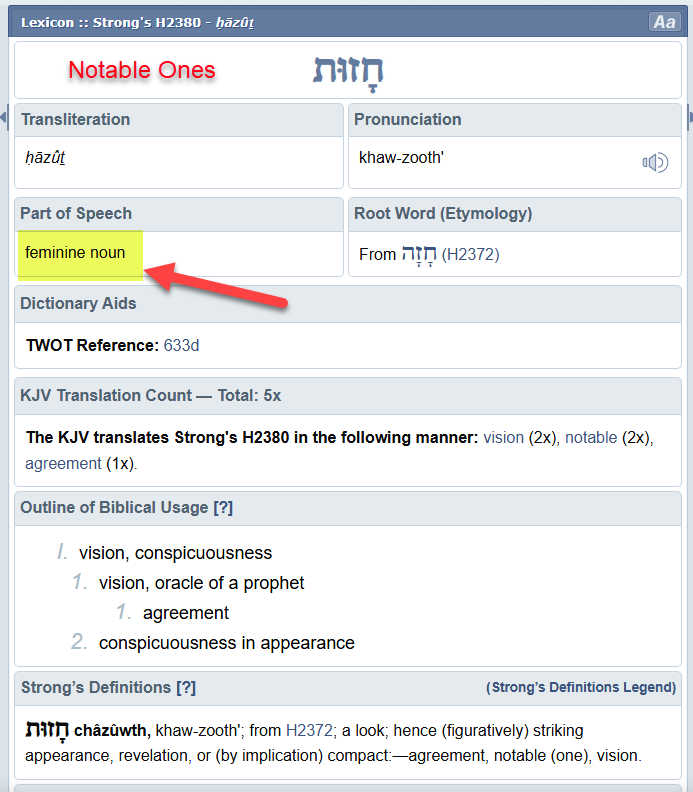
As you can see, "notable ones" is feminine. This reveals to us that the Little Horn did not come out of one of the notable ones in the text.
Now, let's analyze winds: *
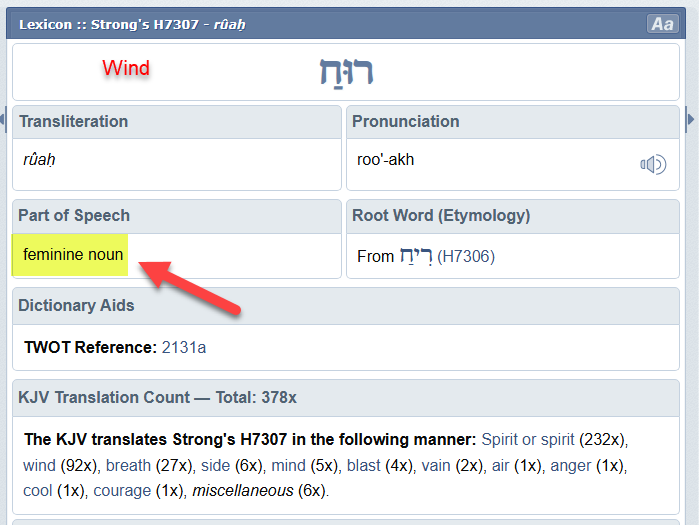
Wait a minute! We seem to have a problem! If "notable ones" is feminine and "wind" is feminine, then that reveals to us that the Little Horn did not arise out of one of the horns or the winds, right? Well, not exactly. Notice what the Lexicon reveals when we analyze "heaven:" *
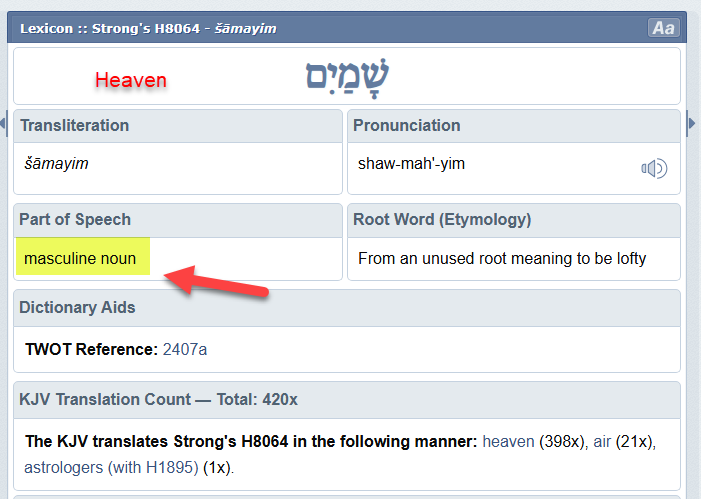
There we have it folks! Heaven is the masculine noun in verse 9. Here's a visual reference of verses 8 and 9 with their correlating genders so we can see the clear picture Daniel has painted for us:
Therefore the he goat waxed very great: and when he was strong, the great horn was broken; and for it came up four notable ones (Feminine) toward the four winds (Feminine) of heaven (Masculine). And out of one of them (Masculine) came forth a little horn, which waxed exceeding great, toward the south, and toward the east, and toward the pleasant land.
Therefore, we have all the proof we need to understand that when the Little Horn arose, it came out of one of the four winds of heaven.
2. Antiochus never waxed exceeding great
Daniel 8:8 says Alexander "waxed very great," while verse 9 says the Little Horn "waxed exceeding great." Here, we can see that Alexander's greatness is juxtaposed with the Little Horn's greatness. When the Bible says the Goat waxed very great, we should understand that Alexander's greatness came from his conquests of the known world in record-setting time. However, we should see that the Little Horn's greatness exceeded Alexander's. Now, we have to ask the question: Is there any metric whereby Antiochus waxed greater than Alexander from a conquest standpoint? It's not even close.
Now, let's analyze where the Little Horn waxed exceeding great towards and determine if that fits the Antiochus narrative, as the writer of Maccabees believed:
Antiochus did not wax exceeding great towards the south
1 Maccabees suggests Antiochus conquered Egypt, but historical records show he only occupied parts of it, never capturing Alexandria (the capital). The historical record also reveals that in 168 BC, less than a year later, Roman ambassador Gaius Popilius Laenas forced him to evacuate Egypt immediately. How can we believe Antiochus waxed exceeding greater than Alexander towards the south when he never conquered Egypt as Alexander did?
Antiochus did not wax exceeding great towards the east
Antiochus's eastern victories were minimal. He informally conquered Armenia when he forced King Artaxias to acknowledge his authority. However, according to the historical record, this did not appear to have affected his control over Greater Armenia as the Armenian king continued to rule unhindered, and his kingdom never integrated into the Seleucid Empire. Antiochus also attempted to plunder the temple in Elymais (Persia) but failed when locals drove him away. Do you believe the locals of Elymais thought Antiochus waxed exceeding great?
3. No Seleucid King would be more powerful than Alexander
According to Daniel 8:22, after the fall of Alexander's Greek kingdom, "four kingdoms shall stand up out of the nation, but not in his power." What does this mean to you? It means that Alexander's power would overshadow that of the four nations that arose after him. In essence, the four kingdoms, including Seleucia under Antiochus, that were to arise after Alexander's death could not be associated with the Little Horn because these kingdoms would never be as powerful as Alexander's Greece, but the Little Horn was said to have waxed "exceeding great."
4. Antiochus desolated Jerusalem and the sanctuary before he set up the abomination
In order to see the truth of the above statement, you first must understand what an Abomination of Desolation is at its core. An Abomination of Desolation is something detestable that LEADS to ruin or desolation. Here, you must see that there is an order of operation to this prophetic phrase. However, when we analyze Antiochus Epiphanes, you will see that the book of Maccabees declares the Abomination was committed after the Desolation. In Maccabees, you will see that Antiochus first stripped the sanctuary, rendering it unusable. He then persecuted the people and destroyed parts of the city. His last act before his fall was forcing them into false worship with idols and finally sacrificing a pig on the altar.
While we cannot minimize the heinous acts of Antiochus, we also have to recognize these acts do not align with the narrative of Daniel 8, where the Transgression (Abomination) preceded the Desolation.
5. Antiochus never desolated the sanctuary for 2300 days
Daniel 8:14 speaks of 2,300 days until the sanctuary is cleansed. Most scholars believe that this means the Jewish sanctuary would be desecrated for that time period. However, the historical records indicate Antiochus desecrated the temple for approximately 3 years and 70 days** (167-164 BC). Clearly, this calculation doesn't come close to the 6 years and 4 months that make up the 2,300 days using the Jewish calendar of 360 days per year.
Some have attempted to resolve this discrepancy by claiming that the 2,300 "days" were actually 2,300 morning and evening sacrifices, but this interpretation has several flaws:
- The text clearly says "days."
- There is no Biblical principle where sacrifices are prophetically substituted for days.
- In Daniel 8, the phrase in the Hebrew for "days" is "ereb boqer." This phrase means evening morning. It's the same phrase that first appears in Genesis 1:5. Thus the evening and morning (ereb and boqer) were the first day. However, what you may not realize is that sacrifices were never denominated by EVENING AND MORNING. Sacrifices were always denominated by MORNING AND EVENING. A few examples of this usage should leave you without any doubt:
- To offer burnt offerings unto the LORD upon the altar of the burnt offering continually morning and evening... 1Chronicles 16:40
- And they set the altar upon his bases; for fear was upon them because of the people of those countries: and they offered burnt offerings thereon unto the LORD, even burnt offerings morning and evening. Ezra 3:3
Thus, the 2,300 evening mornings represent days, not 2,300 morning and evening sacrifices.
6. Antiochus did not arise in the latter time of the divided greek empire
Daniel 8:23 states the little horn would arise "in the latter time of their kingdom." Reading the text, you should understand that "their kingdom" represents the four divisions of the Greek Empire.
Analyzing the timeframe for each of these kingdoms, we determine that the last kingdom to be established was the Seleucid Empire, which was established in 312 BC. Now, in order to determine the latter time of their kingdom, we must determine when the divided Greek Empire fell as a whole. According to the historical record, the final major power to be absorbed into the Roman Empire was the Seleucid Empire in the year 63 BC.
Do you see the problem? Antiochus Epiphanes ruled the Seleucid Empire from 176-164 BC. This places his rulership around the middle of "their kingdom," not the latter time of it.
7. The transgressors had not "come to the full" during the reign of Antiochus
Daniel 8:23 indicates that the Little Horn would arise when the "transgressors are come to the full." The phrase suggests that the Jewish apostasy reached its height during the reign of Antiochus. Although it's clear that the Jews were in apostasy, how do you determine that they had reached their transgression-limit during Antiochus' rulership?
I believe the best way to determine if the Jewish transgression had come to the full during the time of Antiochus would be to determine if Jewish apostasy and punishment were greater at any other time in its history. If we can determine that there was another time whereby their apostasy and punishment were greater, then we know their transgression had not "come to the full" during the 2nd century BC.
Comparing the Jewish transgression under Antiochus with the Jewish transgression under the Romans, we should be able to see that their transgression under the Romans was worse than that of Antiochus. Here is how we know this to be true:
- Under Antiochus, the Jews worshipped idols, and in some cases ceased their feast days.
- Under the Romans, the Jews as a nation rejected Jesus and gave Him over to the Romans to be crucified.
Which one of these actions would you determine represented the transgressors coming to the full?
Comparing their punishments under both situations, you should see that during the Greek era, the Jews were persecuted and their sanctuary was desecrated and parts of their city were destroyed. However, under the Roman era, the Jews were persecuted, their city and sanctuary were completely desecrated and destroyed. In addition to all of that, the Jews were scattered into the nations. Just analyzing their punishment, which one would you say determines that the transgressors had reached their full?
Even without these above scenarios, there is a whole Bible prophecy dedicated to the Jews ending their transgressors during the time of the Romans. Notice what Daniel 9:24 says:
Seventy weeks are determined upon thy people and upon thy holy city, to finish the transgression...
The transgressors could not have come to the full during the 2nd century BC because the 70-week prophecy determined that they had 490 years to finish their transgression.
The Little Horn can only be the Roman Empire
I've written this article in love, but also in the hopes that one day you will see the Little Horn for what he is. If you read this chapter and correlate it with history, you should be able to see that it lines up perfectly with the Imperial and Papal phases of the Roman Empire. Allow me to end this article by making a case for the Romans:
1. Rome emerged from one of the four winds of heaven (The western heaven, to be exact).
2. Rome genuinely "waxed exceeding great," surpassing even Alexander's conquests. It completely conquered:
- Egypt in the south
- The Seleucid Empire in the east
3. Rome was not part of the four horns, which prophecy said they would not have the same power as Alexander the Great.
4. Both phases of Rome set up an Abomination of Desolation. Imperial Rome brought their Pagan gods, called standards, onto the grounds of the Holy City, creating an Abomination. Then they destroyed Jerusalem and the sanctuary as the Desolation. Papal Rome created an Abomination after Rome's conversion to Christianity by adding Pagan practices to the Christian Church. This created a Desolation of God's true believers and under Papal persecution they worshipped in caves and mountains.
5. We will skip over the 2,300 days as this prophecy is not about the Romans or the Little Horn. This prophecy is about the heavenly sanctuary.
6. Imperial Rome became the dominant superpower after defeating the Seleucid Empire. Thus, Imperial Rome rose to supremacy in the latter time of the divided Greek Empire.
7. The 70-weeks prophecy determines that it was during the time of the Romans that the transgressors had come to the full.
Conclusion
While it's understandable why the Antiochus interpretation appeals to many scholars due to surface-level parallels with 1 Maccabees, I believe a deep analysis of this chapter reveals significant problems with this identification. The author of 1 Maccabees, writing during or shortly after a traumatic period, naturally sought to find prophetic meaning in the events surrounding the Antiochus persecution. However, when we examine all the prophetic elements collectively rather than focusing on isolated similarities, the Roman Empire emerges as the only power that fulfills all the criteria described in Daniel 8.
* The english translation in red at the top was added to distinguish which word is the Lexicon if referencing.
** Scholars declare it was originally 3 years and 10 days. However, Jewish reckoning would often intercalate or add an additional 30 days to certain years. Assuming two of the 3 years were reckoned with the additional 30 days is how the timeframe is believed to be 3 years and 70 days.

